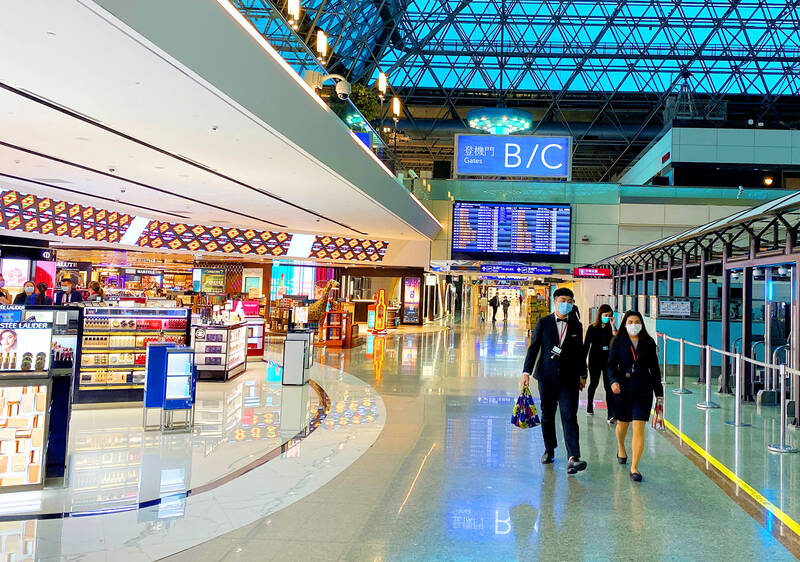Taiwan Taoyuan International Airport is falling behind its competitors as a major transfer hub in the Asia-Pacific region and needs to attract more foreign and budget airlines, an Institute of Transportation study found.
The study on the transfer traffic of US and Japanese carriers in the Asia-Pacific region found that international airlines have been shifting their focus to the region, as they see Southeast Asia and India as their main sources of growth over the next decade.
In line with that trend, airports in the region have been striving to boost capacity, increase flights and create new routes in the hopes of attracting more transit passengers, said the study, which was published in May.

Photo: Ben Blanchard, Reuters
Citing 2019 data, the study said that, as a regional transit hub, Taoyuan airport was trailing the four other major airports in the region: Hong Kong International Airport, Narita International Airport in Japan, Shanghai Pudong International Airport in China, and Incheon International Airport in South Korea.
For example, Taoyuan airport had a 20 percent share of the transit flights from the US to Vietnam, while Incheon Airport had a more than 50 percent share, the study said.
In terms of transit flights to the US, Narita airport topped the list with links to 23 US airports, followed by Incheon, Hong Kong and Shanghai airports with 11 to 17 links to US destinations, while Taoyuan airport had only nine links to US airports, the study showed.
The report said that Taoyuan airport should build its links with foreign airlines, including budget carriers.
It also advised the airport to provide travelers with more choices to increase its transfer passenger numbers via codeshare flights.
Taoyuan airport, run by Taoyuan International Airport Corp, is funded by the Ministry of Transportation and Communications, under which the Institute of Transportation falls.

An undersea cable to Penghu County has been severed, the Ministry of Digital Affairs said today, with a Chinese-funded ship suspected of being responsible. It comes just a month after a Chinese ship was suspected of severing an undersea cable north of Keelung Harbor. The National Communications and Cyber Security Center received a report at 3:03am today from Chunghwa Telecom that the No. 3 cable from Taiwan to Penghu was severed 14.7km off the coast of Tainan, the Ministry of Digital Affairs said. The Coast Guard Administration (CGA) upon receiving a report from Chunghwa Telecom began to monitor the Togolese-flagged Hong Tai (宏泰)

EVA Air is prohibiting the use of portable chargers on board all flights starting from Saturday, while China Airlines is advising passengers not to use them, following the lead of South Korean airlines. Current regulations prohibit portable chargers and lithium batteries from check-in luggage and require them to be properly packed in carry-on baggage, EVA Air said. To improve onboard safety, portable chargers and spare lithium batteries would be prohibited from use on all fights starting on Saturday, it said. Passengers are advised to fully charge electronic devices before boarding and use the AC and USB charging outlets at their seat, it said. South

Hong Kong-based American singer-songwriter Khalil Fong (方大同) has passed away at the age of 41, Fong’s record label confirmed yesterday. “With unwavering optimism in the face of a relentless illness for five years, Khalil Fong gently and gracefully bid farewell to this world on the morning of February 21, 2025, stepping into the next realm of existence to carry forward his purpose and dreams,” Fu Music wrote on the company’s official Facebook page. “The music and graphic novels he gifted to the world remain an eternal testament to his luminous spirit, a timeless treasure for generations to come,” it said. Although Fong’s

WAR SIMULATION: The developers of the board game ‘2045’ consulted experts and analysts, and made maps based on real-life Chinese People’s Liberation Army exercises To stop invading Chinese forces seizing Taiwan, board gamer Ruth Zhong chooses the nuclear option: Dropping an atomic bomb on Taipei to secure the nation’s freedom and her victory. The Taiwanese board game 2045 is a zero-sum contest of military strategy and individual self-interest that puts players on the front lines of a simulated Chinese attack. Their battlefield game tactics would determine the theoretical future of Taiwan, which in the real world faces the constant threat of a Chinese invasion. “The most interesting part of this game is that you have to make continuous decisions based on the evolving situation,